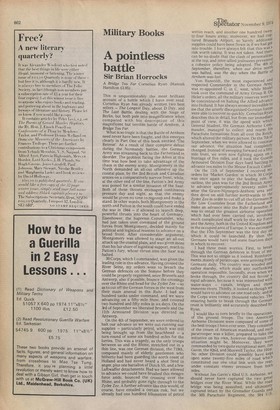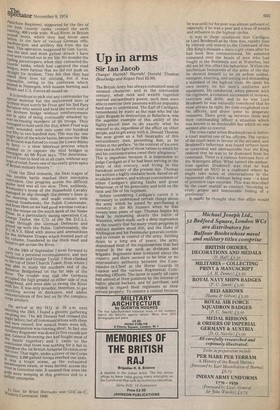A pointless battle
Sir Brian Horrocks
A Bridge Too Far Cornelius Ryan (Hamish Hamilton £3.95) This is unquestionably the. most brilliant account of a battle which I have ever read. Cornelius Ryan has already written two best sellers The Longest Day, about D Day, and The Last Battle, dealing with the Siege of Berlin, but both pale into insignificance when compared with his description of this magnificent but terrible battle of Arnhem, A Bridge Too Far.
What is so tragic is that the Battle of Arnhem need never have been fought, and this emerges clearly in Part One of this book entitled The Retreat'. As a result of their complete defeat during the .Normandy battles, the German Army was streaming back to the Fatherland in disorder. The problem facing the Allies at this time was how best to take agIvantage of the chaos in the enemy army. Montgomery in the North demanded an all-out offensive up the coastal plain, by the 2nd British and Canadian armies on a comparatively narrow front; while, at the other end of the line, Patton's 3rd Army was poised for a similar invasion of the Saar. Both of these threats envisaged continuous pressure day and night, so that the enemy would be given no time to regroup and make a stand. In other words, both Montgomery in the north and Patton in the south could have ended the war in 1944 if allowed to launch deep, powerful thrusts into the heart of Germany. Eisenhower, the Supreme Commander, who had just taken over command of the ground forces from Montgomery, decided mainly for political and logistical reasons to advance on a broad front. After considerable argument, Montgomery was allowed to stage an all-out attack up the coastal plain, and was given more than his fair share of logistical support, much to Patton's fury, whose thrust into the Saar was halted.
30 Corps, which! commanded, was given the leading role in this advance. Having crossed the River Seine, my orders were to breach the German defences on the Somme before they could be properly organised, seize Brussels and Antwerp, also if possible, bounce the crossings over the Rhine and head for the Zyder Zee so as to cut off the German forces in the west from their main arsenal in the Ruhr. I had six hundred tanks under command, and we were advancing on a fifty-mile front, and covered two hundred and fifty miles in six days. On the 3rd of September we liberated Brussels and the 11th Armoured Division was directed on Antwerp.
On the 4th of September, we were ordered to halt our advance as we were out-running our supplies particularly petrol, which was still being brought up from the beachhead a turn-round of some six hundred miles for the lorries. This was a tragedy, as the only troops between us and the Rhine, stretched out in a thin line, was one German division, the 719th, composed mainly of elderly gentlemen who hitherto had been guarding the north coast of Holland and had never heard a shot fired in anger, plus one battalion of Dutch SS, and a few Luftwaffer detachments. Had we been allowed to advance we could have brushed this meagre force aside, bounced the crossing over the Rhine, and probably gone right through to the Zyder Zee. A further advance like this would, of course, have entailed a certain risk, but we already had one hundred kilometres of petrol
within reach, and another one hundred twenty-four hours away; moreover, we had captured Brussels Airport, so -surely additional supplies could have been flown in if we had got into trouble. I have always felt that this was a risk worth taking. It was not taken. And there can be no doubt that the clash of personalities at the top, and inter-allied jealousies prevented a cohesive policy being adopted. The 4th of September, therefore, when our drive north was halted, was the day when the Battle of Arnhem was lost. Von Runstedt, the most experienced and respected Commander in the German ArlrlY was re-appointed C. in C. west, while Model took over the command of Army Group B. On Hitler's orders, all the military reserves were to be concentrated on halting the Allied advance into Holland. It has always seemed incredible to me that the utterly disorganised German forces were able to recover so quickly. Cornelius Ryan describes this in detail, but from our immediate point of view, it was the speed with which General Student, the German Airborne COMmander, managed to collect and rearm his Parachute formations from all over the Reich; which altered the military picture. On the 7th 01 September, when we were allowed to continue our advance, the situation had completelY changed. Instead of sweeping forward on a fiftY mile front, we were now fighting again on a frontage of five miles, and it took the Guards Armoured Division four days hard battling VI) advance ten miles to the Meuse Escault Canal. On the 11th of September I received MY orders for 'Market Garden' in which 30 CorPs was once again to play the leading role. 111 outline, the plan was for the 2nd British Arm) to advance approximately seventy miles to seize the Grave-Nijmegen-Arnhem area and then drive on still further northwards to the Zyder Zee in order to cut off all the Germans it; the Low Countries from the Fatherland an° make an advance into the Ruhr if possible. lt was to entail the greatest airborne operation which had ever been carried out, involving much complicated staff work by the Air Force and the Army, both in the United Kingdom an in the occupied area of Europe. It was estimate° that the 17th September was the first day on Which it could be launched. By then the Germans would have had some fourteen daYs in which to recover. 1 had three main worries. First, to break through the German defences in front of me. This was not so simple as it looked. Reinforcements, mainly of paratroops, were arriving fronl • Germany daily. The country was wooded and rather marshy, which made any outflanking operation impossible. Secondly, even when we broke through, the country did not favour a rapid advance, because it was intersected with water-ways canals, bridges and three immense rivers. Thirdly, it looked as though we would have to advance on one road only, and in the Corps were twenty thousand vehicles. The ensuring battle to break through the German crust is brilliantly and accurately described bY Ryan. I would like to turn briefly to the operations
of the ground troops. The two American Airborne Divisions were composed of some of
the best troops I have ever seen. They consisted
of the cream of American manhood, and each paratrooper was a killer, prepared to take the initiative on his own, however dangerous the situation might be. Moreover, they were commanded by two quite exceptional men, Jun Gavin, the 82nd, and Maxwell Taylor, the 101st. No other Division could possibly have kept open some twenty-five miles of road which constituted our one vital link with the rear, under constant enemy pressure from both sides.
Without Jim Gavin's 82nd U.S. Airborne, we should never have captured the two great
bridges over the River Waal. While the road bridge was being assaulted, and ultirnatelY captured intact by the Grenadier Guards and the 505 Parachute Regiment, the 504 U.S.
Parachute Regiment, supported by the fire of the Irish Guards' tanks, crossed the swift running, 400 yards wide, Waal River, in British ,assault boats, which they had never seen before, in the face of vicious German rifle, Machine-gun, and artillery fire from the far bank. This operation, suggested by Gen. Gavin, Was the best and most gallant attack I have ever seen carried out in my life. No wonder the leading paratroopers, when they contacted the Guards tanks, which had captured the road bridges were furious that we did not push on straight for Arnhem. They felt that they had asked their lives for nothing, but It was
Possible, owing to the confusion which _existed in Nijmegen, with houses burning and British and U.S. Forces all mixed up.
It is invidious to pick out any commander for special mention but the uncrowned hero of Arnhem must surely be Frost and his 2nd Para Battalion who seized and held the north end of the Arnhem bridge without reinforcements and in spite of being continually attacked by ever-increasing numbers of SS troops. They Lnanaged to hold until the 21st, when Frost was badly wounded, with only some one hundred and fifty to two hundred men. This was the one bright spot of the whole battle, because the 10th SS division was forced to cross the Lower Rhine by ferry
enabled — a slow laborious process which
us to capture the vital bridges in NirnieBen. As Mr Ryan says, "The determina!ion of Frost to hold on at all costs, without any hope of relief, forms one of the really great epics Of British military history."
From the 22nd onwards, the final stages of this terrible battle reached their inevitable conclusion. Our progress across the difficult pplder land was all too slow. Then, suddenly, Wrottesley's troop of the Household Cavalry the to slip through the enemy's lines in ,„Lue morning mist, and made contact with Sosabowski, the Polish Commander, and from then on we had good wireless contact Withthe troops on the south bank of the Neder `,..`."ine. In a particularly daring operation Col. George Taylor, the C.O. of the 5th D.C.L.I. roke through the German Defences and tined up with the Poles. Unfortunately, the filled with stores and ammunition for the Airborne Troops which formed part of Ins column, foundered in the thick mud and 'ailed to get across the River.
On the 24th of September I went forward to Carryout a personal reconnaissance, and met sabowski and George Taylor. I then climbed 1-0 the top of Driel Church Tower, from where I Was able to study the southern end Of the zirborne Bridgehead on the far side of the 'civer. The trouble was that the Germans 9,ccopied the high ground on either side of this oridgehead, and were able to sweep the River with fire. It was only possible, therefore, to get anything across in darkness, and under concentrations of fire laid on by the complete e°r•Ps artillery.
on arrival at my H.Q. at 10 a.m, next morning the 25th, I found a gloomy gathering awaiting me. The 4th Dorsets had crossed the Nht before, but all communications with them had now ceased; few assault boats were left, Tild ammunition was running short. In fact one Artillery Regiment was down to five rounds per pin. General Browning (we had fought most of the battle together) and I, came to the conclusion that there was nothing for it but to Nlithdraw the 1st British Airborne Division over the river. That night, under a cover of the Corps Artit'fiery 2,398 gallant troops reached our Imes. was a tragic scene, as the exhausted paratroopers swam, or were ferried, across the river in torrential rain. It seemed that even the g'nds were weeping at this grievous end to a. gallant enterprise.
f-t Oen Sir Brian Horrocks was GOC-ini-C,. West Command, 1946.



































 Previous page
Previous page